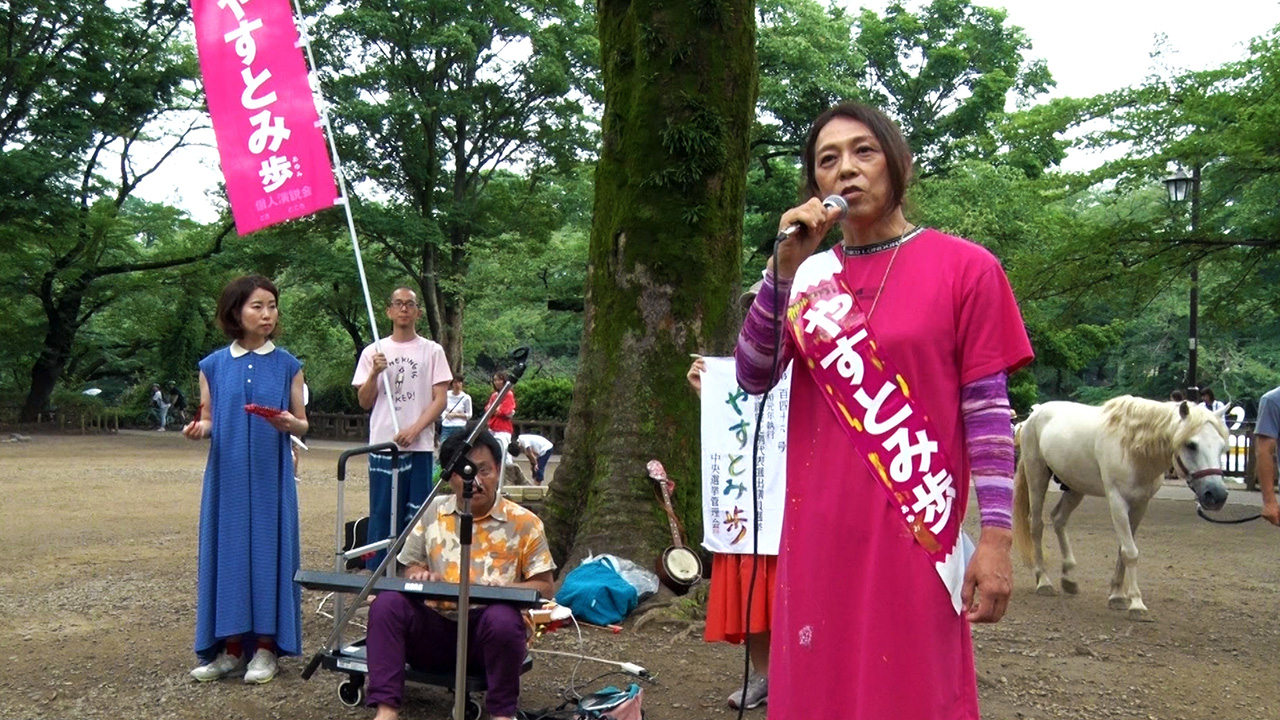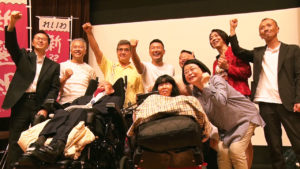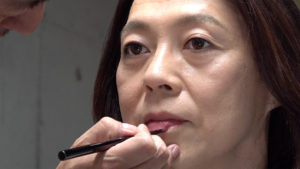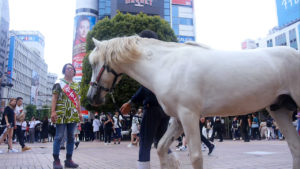2019, Japan, 248min, Documentary, Color, in Japanese with English subtitles
Director: Kazuo Hara. Production & Distribution: 風狂映画舎(Fuukyo Eigasha)
Japan only streaming
Streaming Period: Sept. 5, 2020 @ 0:00 ~ Sept. 6, 2020 @ 24:00 (As long as you start watching during this period, you’ll have access to the film for 48 hours through your purchase history, even after the period ended. 2500yen)
*For RSVP and purchase, click the button below.
Bonus event for ticket holders!
Zoom Q&A w. Dir Kazuo Hara Sunday, Sept. 6th, 11AM Japan Time. Free but RSVP is necessary: [Participation request form]
Sorry, English trasnlatioin will not be available for this event 🙁
Synopsis
Ayumi Yasutomi is a professor at Tokyo University’s Institute for Advanced Studies on Asia. Since 2013, Yasutomi has been dressing as a woman, in order to achieve a way of life that feels the most natural to her. She decided to put herself forward as a proportional representation candidate for Taro Yamamoto’s Reiwa Shinsengumi political group in the 2019 Upper House election, for which campaigning commenced on July 4th and voting began on the 21st. Throughout her campaign, her message was the achievement of a society focused on children. To stand out in a crowded field, she traveled around the country to SL Square in Shimbashi, Tokyo Station’s Red Brick Station Building, Asagaya Station Bus Terminal and other locations in Tokyo, and even as far afield as Asahikawa, Okinawa, and Kyoto. Speaking in front of her hometown station in Osaka’s Sakai City, she began to express her feelings of loss regarding its once beautiful rural landscape that has now become a nondescript residential zone, and the demolition of the junior high schoolhouse where she studied…
Director’s Profile: Kazuo Hara
Born in June of 1945 in Yamaguchi. Established Shisso Productions with Sachiko Kobayashi in 1972, and also made his directorial debut that year with “Goodbye CP.” Released his follow-up “Extreme Private Eros” in 1974. Achieved a huge hit with “The Emperor’s Naked Army Marches On” in 1987, which also received acclaim around the world. Other works include “A Dedicated Life” (1994) and “Sennan Asbestos Disaster” (2017). In 2019, a special retrospective of his entire filmography was held at The Museum of Modern Art (MoMA) in New York.
Director’s filmography: Kazuo Hara
1972 Goodbye CP
1974 EXTREME PRIVATE EROS: LOVE SONG 1974
1987 The Emperor’s Naked Army Marches On
-Best Newcomer Award from the Director’s Guild of Japan
-The Berlin International Film Festival’s Caligari Film Award
-The Cinéma du Réel’s Grand Prix
1994 A Dedicated Life
-Topped film magazine Kinema Junpo’s Best 10 list of Japanese films for that year.
2005 The Many Faces of Chika
2017 Sennan Asbestos Disaster
-Busan International Film Festival, BIFF Mecenat Award
-Yamagata International Documentary Film Festival, Citizens’ Prizes
-TOKYO FILMeX, Audience Award
“Reiwa Uprising”: Director’s statement
During the (2019 Upper House) election campaign, I shot footage with my camera while listening intently to what the (Reiwa Shinsengumi party) candidates said, not wanting to miss a single word. Their every utterance was abundantly compelling and credible, seeping deep into my heart. Listening to their words was, above all, comforting. I had never experienced anything like it before.
To be honest, before the shoot began, I was anxious. The methodology I had used to make my previous works was not applicable, so how should I go about filming? What should I film? These questions were at the root of my uncertainty. By nature, Japanese election campaigns are limited to 17 days. For my documentaries up until that point, I had spent at least one year shooting footage, or three or five years in other cases, so for me, 17 days would go by in the blink of an eye. What on earth could I capture in such a short space of time?
Why devote so much time to shooting footage?
My answer is, in order to depict the life of the protagonist in front of the camera, you spend a long time shooting, then compress it tightly, which reveals the dramatic aspects of their life.
However, for this film, I could not use this method. So, what could I do?
When you become lost, all you can do is go back to where you started. Essentially, a candidate in an election campaign is the subject of my documentary. Election campaigns are about putting forth pledges for voters to consider. To do so, candidates must endeavor to present their own thoughts and beliefs, and way of life. Their tools are their words. Having arrived at this realization, it became clear to me what I should film: their words.
Words that inspire the act of voting for a certain candidate, the physical act of going out and voting, and the impulse to take action. You might say that I myself was inspired to bring to light the spectacular nature of such words.
Frankly speaking, would focusing on words, captured in imagery and sound, make it possible to make a thoroughly entertaining documentary?
I was unsure. For me, “Reiwa Uprising” is a substantially experimental, adventurous documentary.
(2019/ Japan / 248 min / Color / Digital)
Director: Kazuo Hara
Producer/Planner: Chihiro Shimano
Editor: Demo Tanaka,Miki Koike
Produced and Distributed by FUKYO Films



